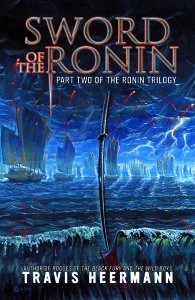A guest post by S. James Nelson.
It’s very likely that the first bit of fiction that anyone writes is crap. There are three potential responses to this:
1. Give up because doing this fiction thing right is going to be hard
2. Remain oblivious to it, and continue writing crap
3. Improve
Don’t give up
If you’re honestly interested in becoming an excellent writer, I’d recommend not choosing the first response. Don’t get all offended at yourself or others who discover that what you wrote is no good. It’s only natural. It’s just a fact of life that the first time you do something you’re not going at be good at it–because, you know, real life isn’t like a video game: designed to be easy at first.
Don’t be oblivious
I’d also recommend avoiding option two–if you want to get good at writing, at least. Oh, maybe you don’t have to be so brutal as to call what you wrote crap, but you should probably at least realize that whatever it was you gave birth to wasn’t perfect. That’s a starting spot: admitting there’s a problem is the first step in correcting it. And writing an imperfect story is a problem, wouldn’t you say?
Improve
So how do you not remain oblivious to the flaws in your writing? It’s nothing new.
Finish something. A story. A book. Something. Anything. Do not revise endlessly, trying to perfect. There is a point where each revision provides less return. As you write more, you’ll learn where this point is. For now, on your first project, assume that after 3 passes it’s as good as it’s going to get. For now. We’ll call it Project 1.
Put Project 1 aside and write Project 2. Immerse yourself in Project 2, to the point that you’ve completely forgotten Project 1 exists (a slight exaggeration). Finish Project 2.
Put Project 2 aside.
Do the pre-writing for Project 3. Depending on the scope, this could take days or weeks or months. I’ll get to the point of having done several revisions on a plot outline, because I’m an outline writer. If you don’t use outlines, hopefully you’ve at least got everything done that you need to do before you start writing. If your first draft is always a piece of junk and you completely re-write draft two, you can treat your first draft as your pre-writing. Just be sure you’re fully immersed in it, and you now spend your mental CPU cycles on Project 3, not Projects 1 or 2.
Once your pre-writing on Project 3 is done, return to Project 1. Read it as if you were your target audience. As you do, take note of things that worked and things that didn’t work. Be brutally honest. This is where you will learn about what works and what didn’t work. You may even notice typos you never saw before. And of course you will–you’re two projects down the road, by now. Naturally you’ve improved. Naturally you’re much smarter and more skilled at this point.
Re-immerse yourself in Project 1, and revise based on the observations you made. Make one pass. Maybe two. Right about now, Project 1 is basically done. It’s probably overkill to set it aside and then return to it a third time.
At this point what’s nice is that the lessons you learned from reviewing Project 1 will stick with you. You’ll be able to apply them in all succeeding projects. And now you’re going to start having at least 3 projects going at once. To keep things simple, there are basically three phases:
Pre-writing
Writing
Fixing and polishing
You want to get to the point where you have a project in each phase. Never complete two phases for a single project at once. Instead, move the other projects on to different phases. Each time you fix and polish, you must learn something. Maybe something about how to tell stories. Maybe something about how to write good prose. Maybe something about world building. But you must always complete step 3 with the following philosophy: steps 1 and 2 did not make this as good as it can be.
The point is that you distance yourself from a project before really finishing it. Then you can return to it with fresh eyes. This is nothing new, and it’s very difficult to do when you’re a new writer because, you know, you feel urgency to finish. But be patient. Set it aside. You’ve got way more time than you know. Work on some other things, then come back to it with fresh eyes. You’ll be amazed.
Be patient
The good news is that “things can only get better” from where you started. The question is, how do you improve? As far as I’m concerned, there is really only one answer to that question, and it’s probably the same answer that a million others have articulated before.
You must practice. You must practice a lot.
It’s the same as with anything. To get good at something, you must do that thing over and over and over, never accepting that what you’ve done was good enough.
A friend and I are learning to golf. We thought we’d like to be as good as Tiger Woods–until we thought about how many golf balls Tiger Woods has hit in his lifetime. A scanning of the Internet indicates that when he was younger, he hit as many as 1,000 balls a day. Some quick math puts his number of balls hit over 20 years at 7.3 million.
That’s a crapload of balls.
If you’re going to be a pro at golf, you’d better plan on hitting millions of golf balls just to get in the game.
Likewise, if you’re going to be a pro writer, plan on writing millions of words. There is no substitute for practice. Nothing can replace the experience of having stories written, completed, and analyzed. You’re going to be competing with people who have millions of words under their belts. You should expect that it’s going to take you millions of words to be able to compete with them.
A few other notes
Read books about writing. Attend seminars. Not everything you read or hear is going to be true or applicable to you. It’s not all going to be useful. But hopefully some of it will be. Personally, I’ve really benefitted from a handful of books, such as Orson Scott Card’s “Character and Viewpoint,” “Self-Editing for Fiction Writers” by Browne and King, and “Writing the Break-out Novel,” by Donal Maass. There are others I’ve read that I haven’t taken much from, or only a thing or two. But in the end, they were probably all worth it.
Spend your time writing, not talking about writing. It’s probably not a bad idea to find one writing group and use it as a tool to improve your writing. But don’t let the writing group detract from your time spent practicing. For each amount of content you want critiqued, read the same amount from others in the group. This is scary, because if you want a book critiqued, and there are five others in the group, that means you’ve got to read five books. that will drain your time. Manage your participation in the group, and be protective of your time. Oh, and only submit something to the group once.
Lose your fear of killing your babies. Yes, this is trite. But it’s true. I’d heard the maxim a thousand times before I really internalized it. Heck, I may not have completely accomplished this yet–I may never. But it’s huge, and fortunately it gets easier with time. You see, when all you’ve written is 100,000 words, it’s hard to admit that you don’t need 10,000 of those. But when you’ve written 2,000,000, it’s much easier to admit you don’t need 10,000 of those. Regardless, it’s very difficult thing to learn to throw away entire chapters or scenes. But it’s true that you must be willing to do this, or your writing will not improve. You must learn to accept the fact that the time you spent writing this or that thing is a sunk cost. You cannot regain it. But your work can get better if you re-write it or delete it or whatever the case is. You cannot hold on to what you’ve written. Once you’re willing to accept that, your writing will get much better. Don’t worry, the more you revise and write, the easier this will become, to the point that you may eventually throw away entire projects because while the idea seemed good at the time, it actually just wasn’t.
Love what you write. Love every character. Love every plot point. Every world you build. Write the story that, when you read it a few years down the road–just for fun–you absolutely adore even despite its imperfections.
I reckon that’s enough advice from a writer still trying to find his way to success–but hopefully one that has at least taken his writing to the “a step above amateurish” level. You should read one of my books and decide for yourself if I’ve succeeded. 😉
And as with those books I said you should read . . . take from this article only what is useful to you. Throw everything else away.







